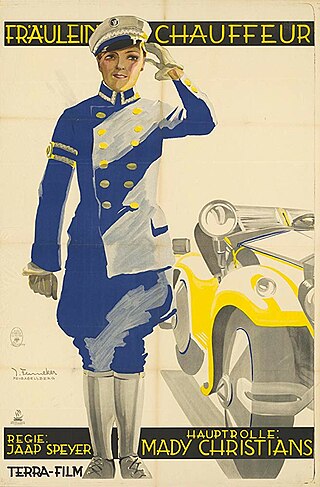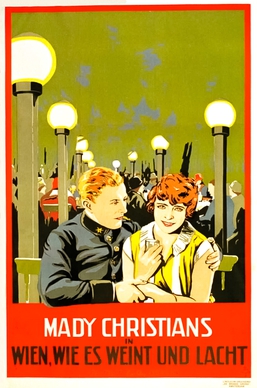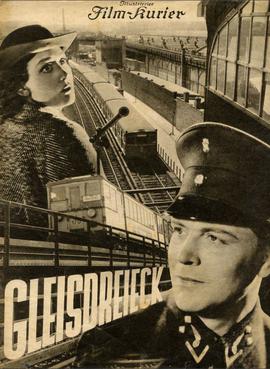Henrik Galeen was an Austrian-born actor, screenwriter and film director considered an influential figure in the development of German Expressionist cinema during the silent era.

The Lady in Black is a 1951 West German crime film directed by Erich Engels and starring Paul Hartmann, Mady Rahl and Rudolf Prack. It was shot at the Bavaria Studios in Munich. The film's sets were designed by the art director Max Mellin.

The Fate of Renate Langen is a 1931 German drama film directed by Rudolf Walther-Fein and starring Mady Christians, Francis Lederer and Hilde Hildebrand.

Miss Chauffeur is a 1928 German comedy film directed by Jaap Speyer and starring Mady Christians, Johannes Riemann, and Lotte Lorring. It was shot at the Terra Studios in Berlin. The film's sets were designed and part directed by the art director Hans Jacoby.

Nanette Makes Everything is a 1926 German silent film directed by Carl Boese and starring Mady Christians, Georg Alexander and Vivian Gibson. It was shot at the Terra Studios in Berlin. The film's sets were designed by the art director Oscar Werndorff.

Debit and Credit is a 1924 German silent drama film directed by Carl Wilhelm and starring Hans Brausewetter, Mady Christians, and Theodor Loos. It is based on the 1855 novel Debit and Credit.

A Woman with Style is a 1928 German silent film directed by Fritz Wendhausen and starring Mady Christians, Peter C. Leska and Hans Thimig. It was shot at the Terra Studios in Berlin. The film's sets were designed by the art director Hans Jacoby.

Iron Gustav is a 1958 West German comedy film directed by George Hurdalek and starring Heinz Rühmann, Lucie Mannheim and Karin Baal. It is based on the real story of cab driver Gustav Hartmann who drove his droshky from Berlin to Paris. The story was previously made into a novel in 1938 and later into a television series of the same title in the 1970s.

Inge and the Millions is a 1933 German comedy film directed by Erich Engel and starring Brigitte Helm, Carl Esmond, and Paul Wegener. Produced by UFA, it was shot at the Babelsberg Studios in Potsdam. The film's sets were designed by Otto Erdmann and Hans Sohnle. Location filming took place in Berlin and around Lake Constance.

Vienna, How it Cries and Laughs is a 1926 German silent film directed by Rudolf Walther-Fein and Rudolf Dworsky and starring Fritz Greiner, John Mylong, and Mady Christians.

Decoy is a 1934 German adventure film directed by Hans Steinhoff and starring Jakob Tiedtke, Viktor de Kowa, and Jessie Vihrog. A separate French-language version, The Decoy, was released the following year with a largely different cast. It was shot at the Babelsberg Studios and on location in Hamburg, Turkey and the North Sea. The film's sets were designed by the art directors Artur Günther and Fritz Maurischat.

Men Are That Way is a 1939 German drama film directed by Arthur Maria Rabenalt and starring Hertha Feiler, Hans Söhnker and Hans Olden. The film's sets were designed by the art director Willi Herrmann. It was remade by Rabenalt in Austria as Arena of Fear (1959).

The Seven Dresses of Katrin is a 1954 West German romantic comedy film directed by Hans Deppe and starring Sonja Ziemann, Paul Klinger, and Georg Thomalla.

Dangerous Crossing or Rail Triangle is a 1937 German crime film directed by Robert A. Stemmle and starring Gustav Fröhlich, Heli Finkenzeller, and Paul Hoffmann. It is set amongst railway workers and takes its name from Gleisdreieck on the Berlin U-Bahn. It was partly shot at the Babelsberg Studios in Potsdam. The film's sets were designed by the art directors Carl Böhm and Erich Czerwonski. It was shot on location around Berlin. It premiered at the city's Ufa-Palast am Zoo.

The Daredevil is a 1931 German crime film directed by Richard Eichberg and starring Hans Albers, Gerda Maurus and Mártha Eggerth.

I Do Not Want to Know Who You Are is a 1932 German comedy film directed by Géza von Bolváry and starring Liane Haid, Gustav Fröhlich, and S.Z. Sakall.
The Fateful Day is a 1921 German silent film directed by Adolf E. Licho and starring Mady Christians, Kurt Stieler, and Karl Beckersachs.
Peter Voss, Thief of Millions or The Man Without a Name is a 1921 German silent adventure film directed by Georg Jacoby and starring Harry Liedtke, Paul Otto, and Mady Christians. It was released in six separate parts. A number of such serials were made during the early Weimar Republic, including Joe May's The Mistress of the World.
Mary Magdalene is a 1920 German silent drama film directed by Reinhold Schünzel and starring Eduard von Winterstein, Ilka Grüning and Lucie Höflich.
Battle of the Sexes is a 1920 German silent film directed by Joseph Delmont and starring Paul Hartmann, Eduard von Winterstein and Eva Everth.















